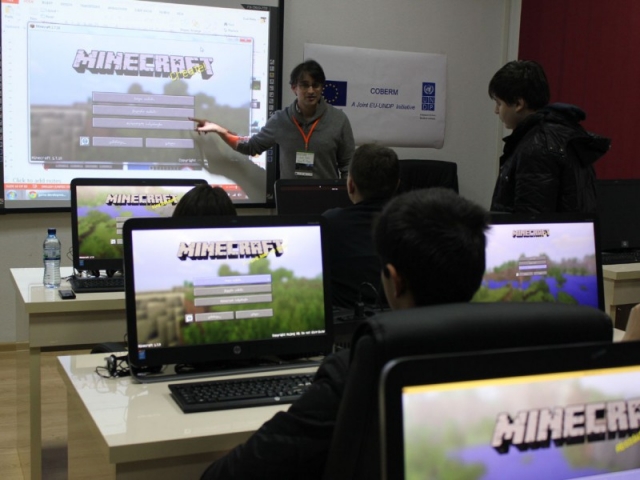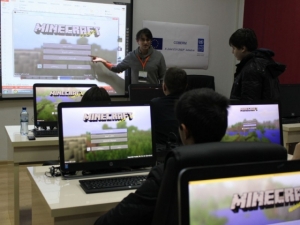Games for Peace, Melting Ice between People Living in Frozen Conflicts
A decade ago if someone had mentioned that internet games and new technologies would be an effective way to build trust between conflicting parts of society, it would have been akin to science fiction.
But today it is a reality, with internet being actively used to diminish physical borders between divided parts of society and make it easier to fill the information gap between communities in conflict, who often know very little about each other.
At least two decades have passed since ethnic conflicts broke out between Georgia and its two breakaway regions Abkhazia and South Ossetia. Today, this conflict remains “frozen,” which means there are no clear military activities, but the territories are still occupied, administrative borders are drawn between Georgia and its breakaway territories, people lack free movement inside the country and internally displaced persons are unable to return to their homes which they were forced to leave after the wars.
Following the collapse of the Soviet Union in the early 1990s, this small country of 3 million people suffered a number of civil wars which left thousands of people homeless and about 20 percent of its territory occupied.
Nino Kalandarishvili, Chair of the Board of the Institute for the Study of Nationalism and Conflicts (ISNC) emphasizes that negative narratives and propaganda from both sides have created an informational vacuum between communities, causing them to lose trust in each other as they perceive their own version of reality, where very often information is either out of date or feeds a common narrative disseminated by more vocal parts of society.
“From 2012 the Georgian Government changed the narrative and policy toward its breakaway regions and is now focused on trust building. The Ministry of Reintegration became the Ministry of Reconciliation and Civil Equality. Such tiny details in the trust building process make a lot of sense. And if youngsters from both sides think about such small details, the peace resolution between us will be much more effective,” Kalandarishvili said.
Sandor Koles, a Hungarian-born sociologist and Senior Advisor to the Budapest based International Center for Democratic Transition (ICDT), who has carried out a number of peacebuilding projects across Eastern Europe, emphasized that to build trust it is important to break through the mental borders dividing separated parts of society, and equally important to change the narrative from conflict to cooperation.
“If people see that they are similar and understand each other's motivations and attitudes, we have made the first steps towards building confidence, which leads us to the next step, which is finding common practical themes and issues around which the people can start to cooperate with each other,” Koles said, highlighting that, together with physical barriers, in many cases mutual mistrust is a psychological obstacle, a mental border which prevents the two disputing parts from communicating.
Today, the internet has changed peace building approaches and organizations focused on conflict resolution projects often use the internet as a tool to connect people from different sides with different backgrounds.
Two years ago a group of Georgian and Abkhaz teenagers participated in a project which aimed to build trust by playing Minecraft, a well-known internet game, which is popular among youngsters around the world.
To break the conflict-related stereotypes between the divided parts of society, tech specialists from Elva Community Engagement, in cooperation with the European Union and UNDP in Georgia, developed an online game named Peace Park that connects peers from across the dividing lines, with the goal of transforming them into peace brokers.
Nino Nanitashvili, Country Manager of Elva, emphasized that the aim of the project was to overcome political, geographical and even verbal barriers between youngsters who have had little communication with each other over the last 20 years.
“Participants of the project were born after the civil war between Georgians and Abkhaz. Their perception of and attitudes towards each other were based on stories which they had heard from the older generation, narratives which are mostly negative. Our goal was to create a positive experience and positive narratives between Georgian and Abkhaz peers,” Nanitashvili said.
Lana, a facilitator of the Gali team in a town located between Georgia and its breakaway region of Abkhazia, believes that games which are separated from arguments and politics should ‘definitely’ be used for peacebuilding between those parts of society not on speaking terms.
“When I saw how they played as a strong team, though apart and able to see each other only through the screen, it really amused me. Not being able to talk each other's languages, they tried to use a "third" language that only they could speak and understand,” she said.
Yet Sandro Asatiani, coordinator of a new media and technology master program at Georgia’s Institute of Public Affairs (GIPA), emphasizes that although virtual reality has its advantages in bringing together a divided part of society, giving them the chance to go and see different places, and meet with different people without restrictions, at the same time it runs the risk of spreading a vast amount of “dis-information” potentially damaging to the peacebuilding process.
“People are not always nice enough to use technologies to make the world a better place to live in,” Asatiani says. “Internet is uncontrolled and a perfect means to spread any kind of information or propaganda which can aggravate the conflict rather than solve it. We should be very careful when using the internet as a tool for peace promotion.”
The participants of the project, however, see things in a positive way.
“I believe that such kind of project is very helpful to make friends from different countries and to find a common language with them and of course to build peace between separated parts of society," Ilona, project participant from Gali said.
“Decades have passed since Georgians and Abkhaz people lost faith in each other," Keti Evsia, project participant from Zugdidi said. "If we don’t start, the right time for it will never come. I believe now is the time to start rebuilding peace between us."
By Tamar Svanidze
Photo: Elva












